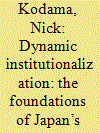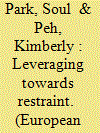| Srl | Item |
| 1 |
ID:
166862


|
|
|
|
|
| Summary/Abstract |
Many have suggested that the true purpose behind Japan’s development of a closed nuclear-fuel cycle is to maintain the technical potential to develop nuclear weapons. However, closer examination of the development of Japan’s nuclear industry shows that, although Japan possesses advanced nuclear technologies, there has been no deliberate strategy to create a nuclear-weapon option. There is no “nuclear hedge.” To illustrate this point, this article presents a framework called “dynamic institutionalization” to explain the origins of Japan’s nuclear policies and the different sets of institutionalized pressures and constraints that have perpetuated these policies over time. Japan’s continued development of closed fuel-cycle technologies is primarily driven by domestic politics and the lack of a permanent spent-fuel management solution. On the other hand, Japan’s institutionalized nuclear forbearance is driven by the calculation that, as long as US extended deterrence remains credible, Japan’s security is best guaranteed through reliance on the US nuclear umbrella. By analytically untangling the policy of closed fuel-cycle development from the rationale for nuclear forbearance, this article provides a more nuanced view of the relationships between the domestic and international variables shaping Japan’s nuclear policies.
|
|
|
|
|
|
|
|
|
|
|
|
|
|
|
|
| 2 |
ID:
114687


|
|
|
|
|
| Publication |
2012.
|
| Summary/Abstract |
In February 2012, Iran announced its willingness to resume negotiations with the Western powers. This statement followed in the wake of a damning report by the International Atomic Energy Agency (IAEA) Board of Governors and the imposition of additional sanctions by the international community on an Iranian economy already under pressure. Tehran's announcement also coincided with increased speculation regarding an Israeli military strike on Iranian nuclear facilities. At the same time, however, this seemingly positive step appeared to be undermined by Iran's concomitant announcement that "huge" technical progress has been made on Iran's nuclear programme. This article will explore the significance of the recent political, diplomatic and technical developments in the Iranian nuclear affair and situate them in the broader context of Tehran's nuclear strategy. The analysis will assess the potential for this latest phase in the Iranian nuclear crisis to reverse Iran's current trajectory and initiate a rapprochement between Iran and Western powers.
|
|
|
|
|
|
|
|
|
|
|
|
|
|
|
|
| 3 |
ID:
171789


|
|
|
|
|
| Summary/Abstract |
The emergence of new nuclear aspirants has posed a great threat to the post-Cold War global non-proliferation regime. These states have adopted a nuclear hedging strategy that has been deemed both strategically risky and politically difficult to maintain. Yet, hedging has not automatically resulted in nuclearisation. We analyse the conditions under which a nuclear hedger shifts its nuclear policy towards one of restraint. Drawing insights from prospect theory, we argue that a nuclear policy shift occurs when a nuclear hedger gains an asymmetric leverage vis-à-vis its adversary. Specifically, a hedging strategy that is based on loss aversion will only be abandoned when a shift in the nuclear aspirant's reference point occurs during negotiations. To test our theoretical arguments, we conduct an in-depth case study of North Korea's nuclear policies throughout the 1990s and 2000s. The empirical study of the changes in North Korea's negotiating stance during the Agreed Framework negotiations and the Six-Party Talks supports our asymmetric leverage thesis. We conclude with broad policy implications for the non-proliferation regime.
|
|
|
|
|
|
|
|
|
|
|
|
|
|
|
|
| 4 |
ID:
140265


|
|
|
|
|
| Summary/Abstract |
For the past decade, much attention has been devoted to the potential consequences of a nuclear-armed Iran. Yet the binary ‘acquisition/restraint’ lens through which the Iranian nuclear issue is frequently viewed is limiting. There is now much evidence to suggest that Iran is engaged in a strategy based on nuclear hedging, rather than an outright pursuit of the bomb. This does not change the need to contain Tehran's proliferation potential, yet it does add another layer of complexity to the challenge. Iran will retain a low level of latency whatever the final outcome of longstanding diplomatic efforts to constrain the scope and pace of its nuclear efforts. This article will explore the implications of Iranian nuclear hedging and consider how regional rivals might interpret and respond to Tehran's nuclear strategy. On a larger scale, the article will explore the potential impact of the international community's approach to the Iranian case—implicitly recognizing, even giving legitimacy to, hedging—both in terms of the future of the Nuclear Non-Proliferation Treaty (NPT) and the ability of the international community to limit the negative effects of this form of proliferation behaviour.
|
|
|
|
|
|
|
|
|
|
|
|
|
|
|
|
| 5 |
ID:
159268


|
|
|